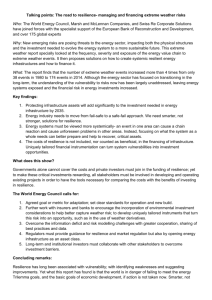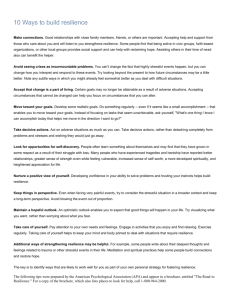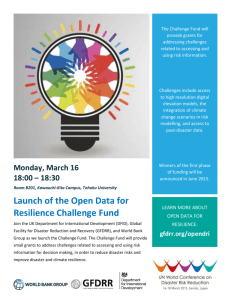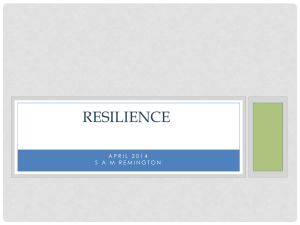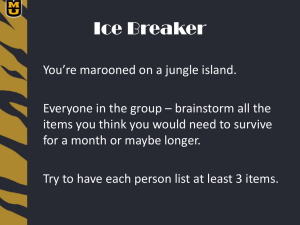Resilience worksheets
advertisement
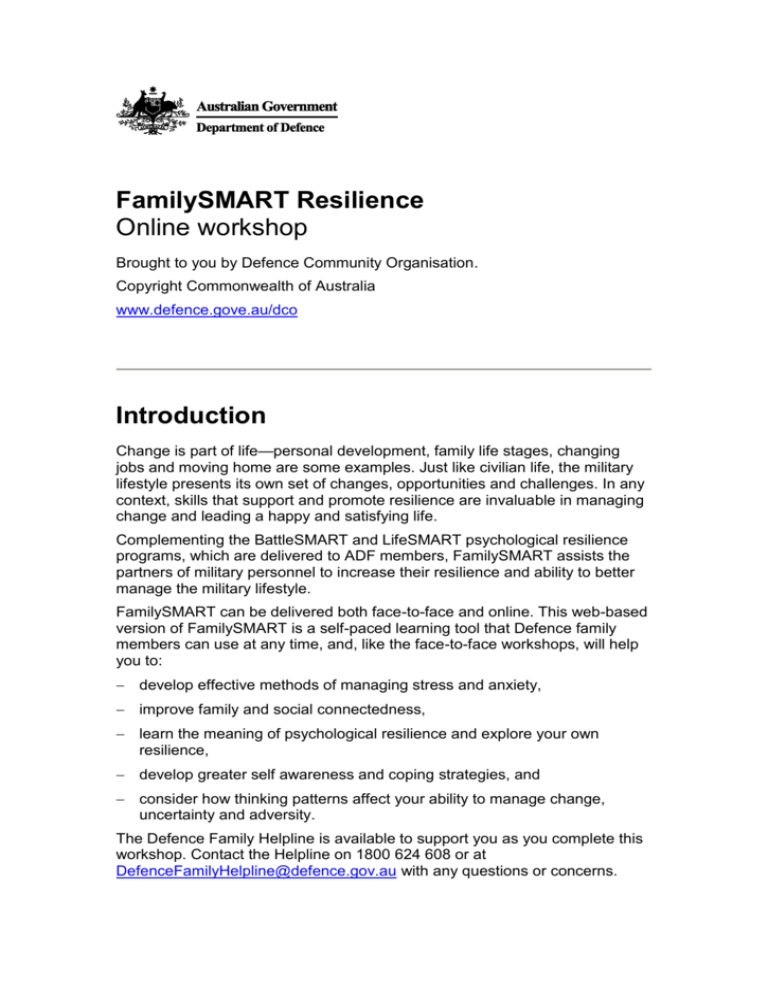
FamilySMART Resilience Online workshop Brought to you by Defence Community Organisation. Copyright Commonwealth of Australia www.defence.gove.au/dco Introduction Change is part of life—personal development, family life stages, changing jobs and moving home are some examples. Just like civilian life, the military lifestyle presents its own set of changes, opportunities and challenges. In any context, skills that support and promote resilience are invaluable in managing change and leading a happy and satisfying life. Complementing the BattleSMART and LifeSMART psychological resilience programs, which are delivered to ADF members, FamilySMART assists the partners of military personnel to increase their resilience and ability to better manage the military lifestyle. FamilySMART can be delivered both face-to-face and online. This web-based version of FamilySMART is a self-paced learning tool that Defence family members can use at any time, and, like the face-to-face workshops, will help you to: develop effective methods of managing stress and anxiety, improve family and social connectedness, learn the meaning of psychological resilience and explore your own resilience, develop greater self awareness and coping strategies, and consider how thinking patterns affect your ability to manage change, uncertainty and adversity. The Defence Family Helpline is available to support you as you complete this workshop. Contact the Helpline on 1800 624 608 or at DefenceFamilyHelpline@defence.gov.au with any questions or concerns. Likewise, contact the Helpline if you would like to attend a face-to-face FamilySMART workshop. What is resilience? Resilience is more than just ‘bouncing back’ from a setback. Resilient people possess a strong core that gives them the ability to structure their life in a resilient way. This workshop addresses the key issues that contribute to personal and social wellbeing and will help you to: manage negative self-image and self-criticism, navigate through crisis, manage grief and anxiety, overcome obstacles in relationships, and bolster your optimism, take chances and embrace life. Some of the most profound changes begin with just the slightest shift in awareness or perception of the following three core traits of resilience: STRENGTH: Feeling equipped to handle both daily life and more challenging times. MEANING: The belief that you are contributing to the world in a way that helps others, in a way that is important to you. Your source of meaning helps you manage high stress and trauma effectively. PLEASURE: Finding deep enjoyment; being enriched and satisfied; and enjoying experiences and activities that bring you a deep sense of pleasure, are essential. When you experience these three traits emotionally and intellectually you have the core components needed to build resilience. The critical roadblock to resilience is not genetics, childhood experience, or a lack of opportunity or wealth. The principal obstacle to tapping into your inner strength lies in your thinking style. We all actively process information, simplifying and organising it in a variety of ways. We are not passive recipients of information—when adversity strikes, we use ‘mental shortcuts’ to make sense of the situation to figure out its causes and implications. How we give meaning to events is built firmly on our assumptions of ourselves and the world. Our reactions are shaped from deeply held beliefs and are often not part of a conscious decision making process. In times of adversity and change, our mental shortcuts can help us manage an overload of information—but they can also lead us astray. As we navigate our way through the world we assume that we are responding to comprehensive, accurate and direct information. But we are not. Our thinking styles and personal biases influence our viewpoint and we sometimes develop patterns of behaviour that are self-defeating. For example, a thinking style that sees problems as insurmountable can lead you to give up, even in a situation in which you have control. Adversity destroys and elevates, it strangles and sparks life. It is a profoundly formative force and either adversity consumes you, or you consume it. There are five essential characteristics of resilience: purpose, perseverance, self reliance, balance and self awareness. Resilience is not something that you have or don’t have—it involves behaviours, thoughts and actions that can be learned and developed in anyone. We all have deeply held beliefs about how the world should operate and who we are. While often these beliefs are subconscious, we tend to behave in ways that are true to our values, yet sometimes these deep beliefs interfere with our ability to live the kind of life we want. These beliefs can explain why we overreact to seemingly minor issues and can impact on our ability to make simple decisions. Learning to identify your deep beliefs and determine when they are working for you and when they are working against you is part of increasing resilience. The very act of noticing your response to difficult situations can in itself lead to great changes in your ability to handle adversity. The following worksheet presents a series of steps to improve your ability to handle adversity. Worksheet 1: Responding to adversity 1. Identify a situation in your life that you consider to be a difficult one. 2. Write down and listen to your response to this situation. The very act of noticing your reaction can disrupt your automatic, learned thinking style. 3. What do you see, hear? What kind of words are you using? Extremes, all or nothing, catastrophic, realistic. 4. Identify aspects that lie within your power to control. 5. Identify specific steps you can take to increase your control over the situation. 6. What can you do to minimise the extent you believe it will affect other areas of your life? 7. Having considered these questions, what have you become aware of? Based on the Harvard Management Update. Handling Adversity. Stoltz, 2011 Resilience worksheets Resilience is said to be the crucial ingredient to a happy, healthy life. It is the key factor in determining how high we rise above what threatens to wear us down—from personal daily battles to life threatening events. Resilience is not just an ability that we are born with and need to survive, but a skill that anyone can learn and improve in order to thrive. It is not about feelgood, quick-fix clichés—resilience is essential to success and happiness. You may be more resilient in some areas than others, and resilience can be influenced by your physical health. However, learning to be more resilient will carry you through life’s challenges. Earlier in this workshop we identified five essential characteristics of resilience: purpose, perseverance, self reliance, balance and self awareness. The following worksheets will help you further explore these essential characteristics. Remember, we are all stronger in some areas than others. Our lives are a journey of learning and developing, not achieving ‘perfection’. Some of the greatest changes begin with just the slightest shift in awareness. Should you feel overwhelmed at any stage while you are working on these worksheets, please take a moment to reflect on the bigger picture of your life. No-one is the sum total of one area in their life. One area in life does not define who we are. You are invited to contact the Defence Family Helpline at any stage as you work through the questions on these worksheets. If you have questions, are feeling overwhelmed, need general support or someone to bounce your ideas off, please call our Helpline staff on 1800 624 608, or email at defencefamilyhelpline@defence.gov.au Worksheet 2: Purpose Having a sense of one's own meaning or purpose in life is probably the most important characteristic of resilience, because it provides the foundation for the other four characteristics. Life without purpose can feel futile and aimless. Purpose propels us to get up and get going each day. When we experience inevitable difficulties, our purpose pulls us forward. Becoming aware of your immediate purpose is straightforward. Rather than spending a lot of time and energy trying to find your purpose, pay attention to what you are called to do every day, and your purpose will soon show itself. The following questions can assist you. 1. What do I do that others value? 2. In what ways am I needed every day, and by whom? 3. What would happen if I stopped doing these things? 4. How would I experience my life if I stopped doing these things? 5. What in my life has the most meaning? Key observations: Having answered these questions, what have I become aware of? Based on the Resilience Scale, Wagnild http://www.resiliencescale.com/papers/ Worksheet 3: Perseverance The determination to keep going despite difficulties, discouragement, and disappointment. We can sometimes be good at persevering with the ‘big’ things in life and find the ‘little’ things more challenging. Repeated failure, rejection and discouragement can be significant roadblocks in life. They can prevent us from moving forward and attaining our goals. Resilient individuals are good at overcoming these hurdles. They tend to keep going and finish what they begin. Resilience is the ability to bounce back when knocked down, and this takes perseverance. It is always tempting to give up, or take the easy path. It takes courage and emotional stamina to keep ‘fighting’ on, and resilient people clearly demonstrate this ability. Establishing and adhering to a routine is one way to strengthen perseverance. Setting realistic goals and attaining them builds perseverance. 1. Think of a goal that you persevered with? A project you completed? How did it make you feel to achieve this (what were the consequences, the spin-off effects)? 2. Name a project that you did not complete? Can you identify a reason (within your control) for not persevering? How did/does it make you feel? 3. Are you able to stay focused on your goals, or are you easily distracted? Can you identify thought patterns or ‘self-talk’ that distract you from your efforts? 4. Having considered these questions what have you become aware of? Based on the Resilience Scale, Wagnild. http://www.resiliencescale.com/papers Worksheet 4: Self reliance Believing that you can rely on yourself is another characteristic of a resilient person. Self-reliance is a belief in yourself, together with a clear understanding of your capabilities and limitations. It is about having realistic outcome expectations; about self-esteem and self-worth, confidence and perceived control. Self reliance is also about acceptance of what is beyond control or cannot be changed. Self-reliant individuals have learned from experiences of success and failure. Furthermore, they use, adapt, strengthen, and refine these skills throughout life. The following questions explore self-reliance. 1. Am I aware of all the things that I do well? 2. How would I describe myself to others? 3. Can I usually think through a problem and work out a good solution? 4. Can I do what needs to be done in an emergency, or do I fall apart? 5. Having considered these questions, what have I become aware of? Based on the Resilience Scale, Wagnild. http://www.resiliencescale.com/papers Worksheet 5: Balance Equanimity means balance and harmony. Resilient people learn to avoid extreme responses. Life is neither all good or all bad but comes with a range of possibilities. One reason resilient people are described as optimistic, is because they are on the lookout for opportunities. Resilient people have also learned to see things in a context; to see the bigger picture; to guide their responses by drawing on experience and wisdom (their own and others). Resilient individuals can laugh at themselves and their circumstances. The following questions explore the idea of balance. 1. When faced with most situations, do they appear overwhelming or ‘doable’? Do I generally see opportunity or obstacles? 2. Dwelling on past regrets can keep us stuck, making it difficult to move on. Do you tend to dwell on past regrets? What are you holding on to that is keeping you from moving forward? 3. Do I tend to create catastrophes from the small things that happen in my life? 4. What kind of language do I use in describing situations/events? (extreme, unrealistic, catastrophic) 5. How would my family and close friends describe me in terms of balance and harmony? 6. Having considered these questions, what have I become aware of? Based on the Resilience Scale, Wagnild. http://www.resiliencescale.com/papers Worksheet 6: Self awareness Resilient individuals learn to live with themselves, in the midst of other people, and are aware of who they are. Much of what we face in life, we need to face alone and it is easier if we are content with ourselves. Along the way, you become 'comfortable in your own skin.' Resilient people are aware that they are unique and do not feel a pressure to conform. They are able to 'go it alone' if necessary. Being existentially alone means you accept yourself just as you are – the good, the bad and the ugly. It does not deny the importance of shared experiences, or significant and close relationships. It recognises that we are unique and have much to contribute to the world around us. Failure to recognise this can lead to despair. A resilient individual recognises their worth. The following questions explore how comfortable you are with yourself. 1. Am I willing to take a course of action that I know to be right, but which is unpopular with my peers; or perhaps goes against the mainstream in life? 2. As I look back at my life, what sets me apart from everyone else? 3. Am I comfortable with who I have become? 4. What have you become aware of as you have considered these questions? Based on the Resilience Scale, Wagnild. http://www.resiliencescale.com/papers Worksheet 7: Reflection Following completion of the six worksheets, consider the following: 1. How would you rank your five areas of resilience? 2. Which areas do you believe need deeper exploration? 3. Are you able to identify any deep seated beliefs which are guiding your behaviour in these areas? Remember, it is realistically possible to bring about a shift in our thinking styles. Resilience it not a fluke; it generally emerges in people who’ve trained hard, have particular attitudes, cognitive and emotional skills and a deep determination to overcome serious challenges. Resilience is not a trait that people either have or do not have. Resilience involves behaviours, thoughts, and actions that can be learned and developed in anyone. Trying to become something you are not, while there's plenty of value in who you are, can be self-defeating. Rather than judging negative thoughts, observe them with compassion. Then ask yourself, “What can I do about this?” In the following section we will consider ways and means of building resilience and managing change and uncertainty. Increasing your resilience The intent of this workshop is to help you to tap into your existing strengths and enhance your resilience. While you probably use many of the strategies outlined already, this is a good opportunity to take the time to identify your goals and think through your resilience strategy. The previous worksheets helped you explore the various aspects of individual resilience, with ‘awareness’ being the most important starting point for building resilience. Having completed these worksheets and reflected on your answers, consider some of the suggestions below and how you might incorporate them into your everyday life. Listen to yourself Listen to your thoughts and identify what you say to yourself when faced with a challenge, and consider how your thoughts affect your feelings and behaviours. Avoid thinking traps When things go wrong, do you automatically blame yourself? Do you blame others? Do you jump to conclusions? Do you assume that you know what another person is thinking? Identify your deeply held foundation beliefs We all have deeply held beliefs about how the world should operate and who we are. While often these beliefs are subconscious, we tend to behave in ways that are true to our values, yet sometimes these deep beliefs interfere with our ability to live the kind of life we want. These deeply held beliefs can explain why we overreact to seemingly minor issues and can impact on our ability to make simple decisions. Learning to identify your deep beliefs and determine when they are working for you and when they are working against you is part of increasing resilience. The very act of noticing your response to difficult situations can in itself lead to great changes in your ability to handle adversity. Challenge your beliefs Test the accuracy of your beliefs about problems. How effective are you at solving the problems that you encounter day to day? Do you waste time pursuing solutions that do not work? Do you feel helpless to change situations? It is our thinking style that often leads to a misunderstanding of the cause of a problem, which can lead us to pursue the wrong solution. Put it in perspective Getting caught in ‘what if’ thoughts turns every failure or problem into a catastrophe. It wastes time and energy and generally sends us further into negativity and paralysing anxiety about events that have not even occurred. Be calm and focused Stress can feel overwhelming. Emotions can emerge quickly and fiercely, clouding our thought processes. There are various practices for focusing and calming emotions in the heat of the moment. You may wish to try those outlined at the end of this program. See ‘Techniques for immediate stress relief’. Real-time resilience This means staying connected with the moment and remaining in the present. It is not necessary to use every skill every day to see improvement in your resilience. Many people find dramatic changes in their resilience after mastering just two or three of these skills. Managing change and uncertainty Uncertainty is one of the primary reasons that people resist change. In fact, people are quite adaptable once they know more about a situation, even if they don’t like what’s happening. Change is an integral part of the military lifestyle. After completing initial training, ADF members are posted to different Defence establishments according to Service requirements, roughly every two to four years. There are many ways to reduce the stress of posting and moving so that you and your family can experience it as a positive and rewarding time. Provide certainty of process Talking to your family regularly and clearly about an upcoming move can reduce some of the anxiety of uncertainty they may experience. Family activities conducted regularly, regardless of location and change, can help families keep moving forward even when situations are not yet fully resolved. It is particularly important to talk to children about the move. Share details that they can understand, encourage questions and listen to what they have to say. Take action where you can Uncertainty makes it tempting to let material things deteriorate, while fixing things that can be improved represents productive action. It represents forward thinking and positivity. Let ideas flow With gossip and speculation often breeding in the face of uncertainty, it can be a good time to productively brainstorm about possible futures. Use purpose and values to ‘think beyond’ Emphasising who we are and what we stand for provides grounding. It reminds people of the long-term, thinking beyond the immediate uncertainty. It also supports people to remain connected to one another. Some practical tips Plan ahead and get organised. Make a list of all the tasks that need to be completed and set small, manageable goals each week. Moving can also provide the motivation to de-clutter your home, which some find brings clarity of thought. Say goodbye. Allow time to say goodbye to people and places, quietly or by throwing a party. This is an important step to help bring about closure. Allow time to adjust. Expect to experience various feelings when you arrive in the new location. If you are moving to a foreign country, research the culture and be prepared. Build a new routine. This will help ground you and your family—the sooner you establish new routines, the more comfortable you will feel. Create positive habits. Relocation can be a good time to introduce positive habits to support your health, wellbeing and relationships. Healthy eating, a new exercise regime, special family time—select one to work on and establish a new habit gently. Get help If you feel overwhelmed at any time, support is available. Contact the Defence Family Helpline on 1800 624 608 anytime, day or night. Support staff will provide you with information, contacts and resources to help you manage mobile lifestyle and alleviate the effects of relocation on family wellbeing. In the next section of this workshop we look at how we think about and can prepare for change. Consider the changes your next posting will introduce into your life. Take some time to imagine yourself in the new environment. Change and thinking patterns The way we choose to think about stressful situations is the biggest predictor of just how big the stress will become. Our ‘little voice within’ can determine how we feel and how we shape our response to stress. It is possible to change how you think about the stressors in your life. Our imagination can run away with us, causing a lot of unproductive worry, increasing stress and influencing our actions and feelings. Similarly, our imagination can help us control unnecessary stress. While our bodies and minds are built to manage stress, sometimes the amount of stress can overwhelm our defences. When this happens, we start to act, feel, and think in ways which are perhaps different from what is normal for us. How we manage stress depends largely on the nature of the stress and the strength of our defences at the time the stress occurs. The strength of your defences will vary over time and will depend on what else is going on in your life and your overall health. Defence families in particular experience unique emotional challenges. Deployment, single parenting and family member absence can be a stressful part of military life. During these times you may feel sad or hopeless and you may withdraw from friends, families, and colleagues. It is important that you seek care for you and your family during these times. Change can be particularly challenging when it introduces circumstances different to those we assumed we would experience. This also happens when we have grown accustomed to situations and built them into our thinking about the future. Assumptions also extend to our belief system. Individual change Change is driven both externally and internally. Worksheets 8 and 9 explore individual, internally driven change. Worksheet 8: Accomplishment and adversity Think about the main accomplishment you have always wanted to achieve. Select one that: Excites and possibly even frightens you. Enriches you deeply. Inspires your strongest will. Improves you, makes you a better person. Benefits others (ultimately) in some meaningful way, if successful. Builds capacity, demonstrates and strengthens your capacity to manage future challenges. Motivates and energises you. Now, select the one setback (obstacle, hardship, difficulty) that you are sure to face as you take up your challenge. If overcome, which setback would offer you the greatest breakthrough? Examples: fear of other’s judgements; fear of failure; feeling incompetent; no time etc. Consider how you would feel if you overcame this setback? This worksheet is based on the work of Dr Stoltz, author of Handling Adversity, 2011 Worksheet 9: How does it feel? Consider that you have achieved this desired accomplishment. 1. What does life look like for you now? 2. What is happening? 3. What are you doing? 4. What are you feeling? 5. What are you thinking? 6. How are you feeling physically? 7. What aspects make you feel emotionally good? 8. What is the greatest challenge for you right now? 9. What positive facts do you know? Your wellbeing safety plan Change, planned and unplanned, can present many challenges. Change naturally affects the mind and body and as individuals we react and respond in different ways. Life is unpredictable and often it’s the little things that catch us by surprise, providing either stress or joy. The saying ‘knowledge is power’ holds true here—when we arm ourselves with insight and action plans we empower ourselves. While humans are both resourceful and resilient, sometimes it does just become ‘all too much’. Being human means that emotions and situations can catch us unawares at times—we are not all-knowing, all-seeing creatures. Because we often respond to situations based on our previous experiences it is helpful to consider our potential responses before we are faced with a stressful situation. One of the best ways to do this is through ‘scenario planning’, which allows you to consider how you may respond to a stressful situation and how to improve your self-awareness during challenging times. Worksheet 10, Consider your next posting, will assist you in this task, and as you complete it, consider the following questions: How can you reframe your thoughts? What kind of language do you use when describing situations and events— extreme, unrealistic, realistic? Try changing the language you use. Rewrite your reflections and change adversities into opportunities. Worksheet 10: Consider your next posting 1. What does life look like for me? 2. What is happening? 3. What am I doing? 4. What am I feeling? 5. What am I thinking? 6. How am I feeling physically? 7. Who am I talking to? 8. What makes me feel emotionally good? 9. Who can I help? 10. What is the greatest challenge for me right now? 11. What positive facts do I know? 12. Things I can do to support myself at this time are 13. What 3 things are ok to let slide? 14. What 3 things are NOT ok to let slide? Maintaining connections Establishing meaningful connections with others is an important component of building and maintaining resistance. It is important to maintain social supports and a sense of connectedness, even if it seems an effort. Human beings are social and communal creatures—people need people, even if by nature you are an introvert. Maintaining meaningful interpersonal relationships is critical to building resilience effectively. Relationships provide both emotional and cognitive opportunities for us to develop strength, meaning and pleasure. This increases our personal resilience more than living life alone, in solitude. Having an understanding and awareness of your own values is an important part of being more self-aware and increasing your capacity for resilience. In the next section, you will examine different areas in your life and the value you attach to each. Tips Some reactions to change can be unhelpful, especially in the long term. They can become problematic if they persist. Monitor responses and ‘check in’ with others. Consider the positive responses you have identified in these exercises and how you can incorporate them into your responses to everyday stressors. Anchors in times of change Being aware of your values is an important building block in enhancing life skills. Values emerge from the areas in your life that you place importance on. Values can act as ‘anchors’ in times of change, when you feel out of your depth. During these times being aware of your values can help anchor you to what you believe is true and consistent. When we live with an awareness of the principles that are important to us, we can reduce inner conflict and increase a sense of control. When we are not living in accord with our values, we find ourselves in conflict. This can reduce our tolerance for stress and create a feeling of unease within. While your values may be consistent over time, their priority shifts with changing life stages. There are times when you may feel you have several values competing and conflicting with each other. This does not mean you need to abandon a value—you just need to adjust activities for a period. The following worksheet will help you to identify and prioritise your values. This is not a conclusive list—you may wish to add to it, or you may find some that do not apply to you. You may find the following worksheet a useful activity to do individually and with other family members. You are asked to rate the value in your life and explore the actions you take to live according to each value. A point to ponder is ‘Are my actions and values consistent?’ Worksheet 11: Values What value do you place on this element? Rate each one from zero to ten, with zero being lowest value and ten the highest value. Health and wellbeing What am I doing to live according to this value now? How will I live according to this value during the next 18 months? Financial stability What am I doing to live according to this value now? How will I live according to this value during the next 18 months? Career What am I doing to live according to this value now? How will I live according to this value during the next 18 months? Family relationships What am I doing to live according to this value now? How will I live according to this value during the next 18 months? Parenting (your own or other’s children) What am I doing to live according to this value now? How will I live according to this value during the next 18 months? Spirituality What am I doing to live according to this value now? How will I live according to this value during the next 18 months? Creativity What am I doing to live according to this value now? How will I live according to this value during the next 18 months? Self development What am I doing to live according to this value now? How will I live according to this value during the next 18 months? Community What am I doing to live according to this value now? How will I live according to this value during the next 18 months? Social/Friends What am I doing to live according to this value now? How will I live according to this value during the next 18 months? Insert your own value What am I doing to live according to this value now? How will I live according to this value during the next 18 months? Insert your own value What am I doing to live according to this value now? How will I live according to this value during the next 18 months? Reframing thoughts Replace or swap behaviours that are not helpful to you; rather than simply trying to stop them. It is much easier to move toward things that are good for you and away from things that are bad for you. Remember you are human. Have compassion on yourself and be kind and gentle with yourself. Be the ‘captain of your own ship’. Move away from being a victim to being a person in charge of your reactions. While it may not be possible to control a situation, you can control your own reaction to it. Keep Churchill’s quote in mind: ‘History will be kind to me for I plan to write it myself’. Help is at hand when you need it. There are many agencies and services that exist to support you, including your doctor, a counsellor, the Defence Family Helpline, Lifeline to name a few. A situation does not have to be perfect, just workable. Take action to improve your situation, even if the solution isn’t perfect. No one’s world is perfect— work with what you have and work it well! Stimulate both your body and your mind. Be active at times and quieter at other times. Find a balance in spending time with people but also find time to be alone. Remember the many ways in which you are fortunate. Worksheet 12: Techniques for stress relief Breathing exercise Imagine it’s a cold day and you can see the puff of your breath—is it a big puff? Now try breathing using your belly. Try to picture your chest as big as a beach ball, inflating and deflating. When you breathe in (inhale) the ball fills and you can see all the colours. When you breathe out (exhale) the ball crumples. Push your belly out when you breath in. You bring your belly in when you breath out. Try to breathe through your nose, placing your hand on your stomach. Feel your hand moving up and down as you breath in and out. Practice inhale-exhale (repeat several times) Practice inhale-hold-exhale (repeat several times) Simple stress reduction technique ‘You make me feel so good…’ Association is powerful. Think of something you have that makes you feel good when you see or touch it. It could be anything, from a picture, a dried flower, a special stone, a letter and so-on. If you can, carry it with you or simply put it somewhere in sight so that it can help remind you that the way you feel right now doesn’t cancel all the other wonderful things in your life. You have now completed the FamilySMART Resilience online workshop For more information and resources on resilience and managing the military lifestyle, contact the Defence Family Helpline anytime on 1800 624 608. To provide us with feedback on this workshop send an email to DefenceFamilyHelpline@defence.gov.au


